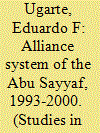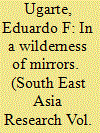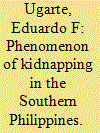| Srl | Item |
| 1 |
ID:
080905


|
|
|
|
|
| Publication |
2008.
|
| Summary/Abstract |
Unsettled conditions on Jolo and Basilan islands in the southwestern Philippines have seriously hampered efforts to obtain information about the Abu Sayyaf. The result has been a continuing ignorance over the most fundamental features of the group. In the attempt to broaden our understanding of its structure, this article examines data drawn from an array of sources in light of the authoritative work of Thomas Kiefer on the traditional Tausug alliance system on Jolo. It argues that the Abu Sayyaf consists of a system of alliance groups of the kind customarily found in Muslim Filipino societies
|
|
|
|
|
|
|
|
|
|
|
|
|
|
|
|
| 2 |
ID:
099448


|
|
|
|
|
| Publication |
2010.
|
| Summary/Abstract |
Most media coverage of the 'Abu Sayyaf', an allegedly militant Islamist group or organization in the Philippines, derives ultimately from official sources, but the information provided by such sources has never been subject to scrutiny. To redress the oversight, this paper critically examines official and media accounts of the 'Abu Sayyaf'. Beginning with a survey of media reports from June 2007 to January 2009, it highlights the contradictions uncovered in the sample before accounting for such inconsistencies and other peculiarities in terms of Edward Herman and Noam Chomsky's propaganda model. Applying the model to the performance of the media in the southwestern Philippines, the paper then looks at the factors that render journalists in the region highly dependent on official sources for data, and hence vulnerable to state disinformation, before exploring the framework of presuppositions that influence popular representations of the 'Abu Sayyaf' and the troubles in the zone.
|
|
|
|
|
|
|
|
|
|
|
|
|
|
|
|
| 3 |
ID:
085885


|
|
|
|
|
| Publication |
2008.
|
| Summary/Abstract |
The Philippine government, military and media regularly represent the Abu Sayyaf as being the main perpetrators of atrocities in the southern Philippines. This paper challenges such representations through an outline of the phenomenon of kidnapping in the region. Opening with a vignette of the phenomenon drawn from primary sources, the paper then considers in greater detail its objective conditions, the identities of its perpetrators and sponsors, and their interdependencies. The available evidence strongly indicates that kidnappings in the zone are instigated mainly by key power brokers, who engage or collaborate with local armed groups for the purpose.
|
|
|
|
|
|
|
|
|
|
|
|
|
|
|
|